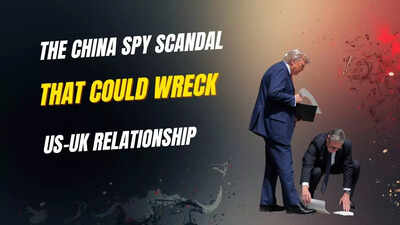When two men accused of spying for Beijing walked free from a London court last month, the tremors were felt far beyond Westminster. In Washington, they registered as something much more serious: a fissure in the foundation of one of the world’s most trusted intelligence partnerships. Now, the White House is warning that Britain’s failure to prosecute the alleged spies – a decision critics say was motivated by a desire to appease China – could put the “special relationship” itself at risk. As suspicions swirl around political pressure, economic influence and strategic hesitancy in London, the fallout threatens to redraw the contours of security cooperation between the UK and the US at a time when both nations face growing Chinese influence.
Driving the news
The White House issued an unusually blunt warning to the United Kingdom after prosecutors dropped espionage charges against two British men accused of spying for China — a decision that infuriated Washington and raised doubts about Britain’s reliability as a security partner.The collapse of the high-profile case against Chris Cash, a former parliamentary investigator, and Christopher Berry, an academic, has sparked a political storm in London and a diplomatic row with Washington. Senior Trump administration officials say continued information sharing could be at risk, as Republicans urge the UK to revive the prosecution to send a clear message to Beijing.
Why does this matter
For decades, the UK and the US have shared some of the world’s most sensitive information under the “Five Eyes” alliance. That trust depends on both sides treating espionage threats with equal seriousness. The decision to drop the charges – reportedly because the administration refused to label China an “enemy” – is being seen in Washington as a sign that London is softening to Beijing, just as President Trump escalates a trade war and warns allies about Chinese infiltration.If Britain is seen as politically reluctant to confront Chinese espionage, U.S. officials say, intelligence cooperation — the bedrock of the transatlantic security relationship — could be undermined.
The Big Picture
The collapsed case: Cash and Berry were charged under the Official Secrets Act 1911, accused of passing confidential information to a Chinese agent between 2021 and 2023. Prosecutors said Berry produced at least 34 reports to Beijing, some damaging to the UK’s national security. But the case imploded when authorities refused to define China as an “enemy” – a legal requirement for prosecution.Washington’s Anger: A senior US official warned that failure to prosecute “coercion and adversarial influence” could limit future intelligence sharing. John Moolenaar, head of the House Committee on China, urged Britain not to let the case “falter”.Political consequences in London: Opposition parties, former spy chiefs and conservative leaders have accused Prime Minister Keir Starmer of appeasing China to secure investment. They allege that Treasury and National Security Advisor Jonathan Powell pressured prosecutors to drop the case and delay the publication of a critical audit on China.Powell under attack: Powell, once chief of staff to Tony Blair, faces calls to resign. He is linked to pro-China groups and was reportedly involved in negotiations over the return of the Chagos Islands to Mauritius, an ally of Beijing. Government sources deny that he influenced the decision.Trade and diplomacy entangled: China has tied major economic incentives to its demands. Beijing’s ambassador warned that the planned new Chinese embassy in London would not come to fruition without guarantees. Jingye, the Chinese owner of British Steel, has offered to waive a billion-pound compensation claim if the embassy is approved.Broader voltages: The scandal comes as Trump increases tariffs on Chinese goods to 130% and accuses Beijing of restricting essential mineral exports. Meanwhile, Starmer’s government is accused of softening Britain’s stance on China, including on sensitive issues such as Huawei, foreign investment and human rights.What’s next: Parliament is expected to hold an emergency debate. Conservatives are exploring legal action against the government under the National Security Law, and pressure is growing for a public explanation from the attorney general. With trust between the US and UK now visibly strained, the fate of future intelligence cooperation – and British policy towards China – hangs in the balance.


Leave a Reply